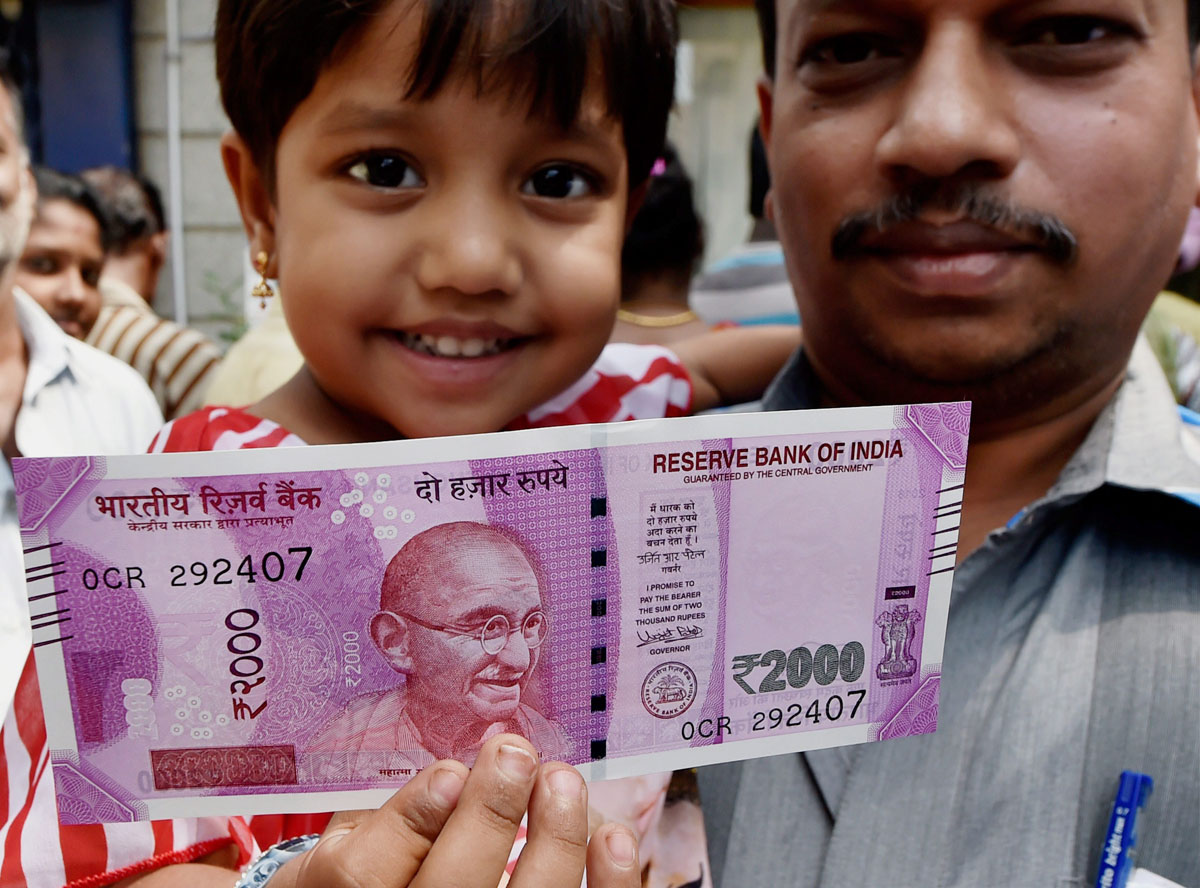NRIs WORRIED AS INDIA ISSUES NEW CURRENCY NOTES
A child is all smiles with her father as she shows the new Rs. 2,000 note they received after exchanging their old Rs. 500 and Rs. 1,000 notes in Chennai, India, Nov. 10. (Press Trust of India)
In a surprise move, Prime Minister Narendra Modi, on Nov. 8, announced demonetization of Rs. 500 and Rs. 1,000 notes and introduction of the new Rs. 500 and Rs. 2,000 ones with additional security features. People in Delhi, and elsewhere in India, continued to face difficulties in paying for household items, essential commodities and vegetables as they ran out of savings of small currencies while it was tough to get cash from banks which opened after a day’s break, due to huge rush and long queues. NRIs, meanwhile are concerned about their situation outside of India and while we have tried to contact the Indian Consulate in San Francisco, there was no definite answer available at the time of writing this article. – @Siliconeer #Siliconeer #narendramodi @namo #namo #India #Demonitization #IndiaNewCurrency #IndianConsumers #NRI #SanFranciscoIndianConsulate #IndianConsulate
Long Lines in Banks to Exchange Notes
While serpentine queues were witnessed at banks across Delhi where people thronged to exchange Rs. 500 and Rs. 1,000 for new currency, some of the banks ran out of cash. In many areas, people were seen lining up outside banks even before they opened for business.
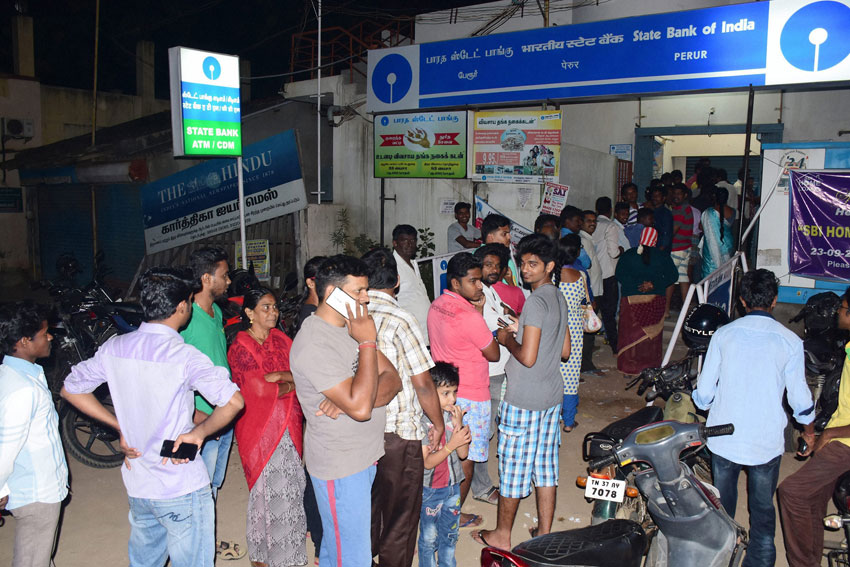
“First I had to wait for four hours to get new currency of Rs. 4,000 then I still could not buy anything because I just had two notes of Rs. 2,000. As the lower currency notes are available in limited quantity nobody could give me change,” Bharti Raghav, a housewife said.
The city has been witnessing chaos and anxiety since the night of Nov. 8, after the Indian government’s announcement to withdraw Rs. 500 and Rs. 1,000 notes.
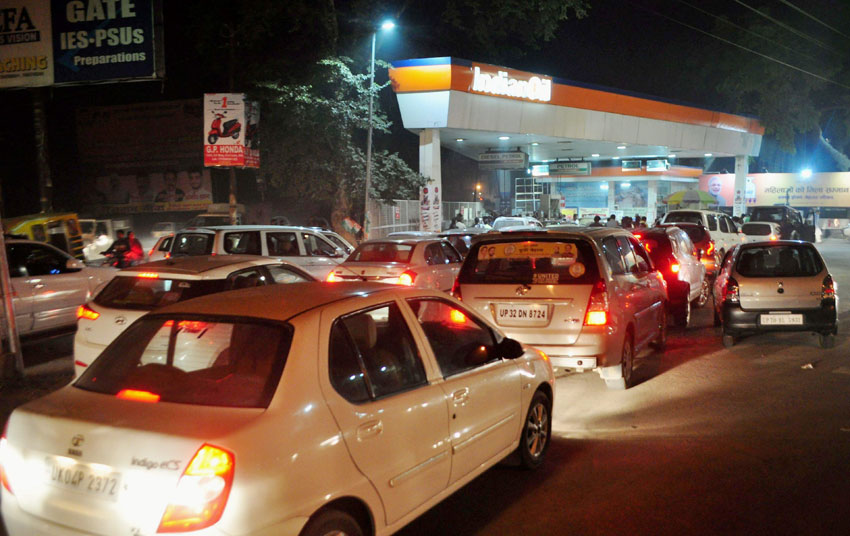
People are particularly facing difficulties in buying milk, vegetables, medicines and other daily essentials and in commuting in auto-rickshaws and taxis.
Citizens in many areas were seen fuming over having to wait in long queues in banks for hours on a working day.
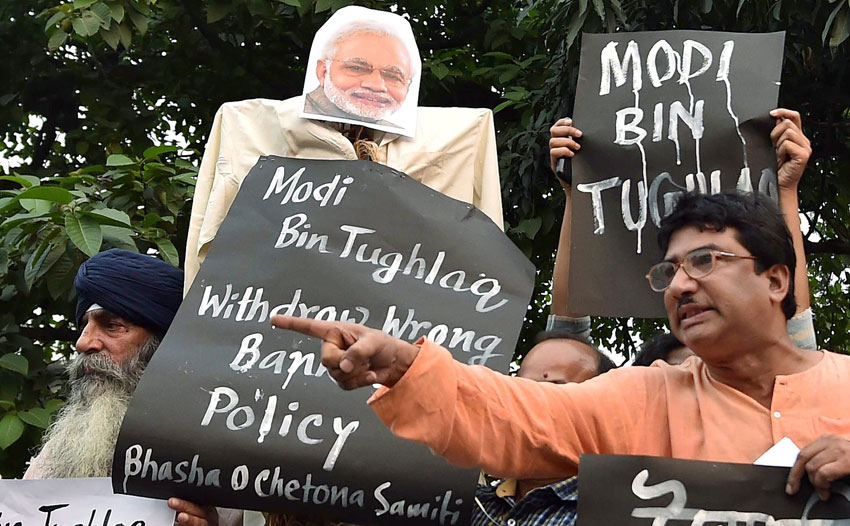
Security was also beefed up in banks in view of the rush of people. As many 3,400 personnel of paramilitary and Delhi Police along with quick reaction teams have been deployed across the national capital for maintaining security in banks.
“Despite having money with us, we are struggling for basic necessities as grocery stores, vegetable vendors and other stores are not accepting Rs. 500/1000 notes. I had to take leave from office to exchange notes as there is such a long queue that my turn will not come before another 3-4 hours,” said Kumkum Bhargav, a primary school teacher.
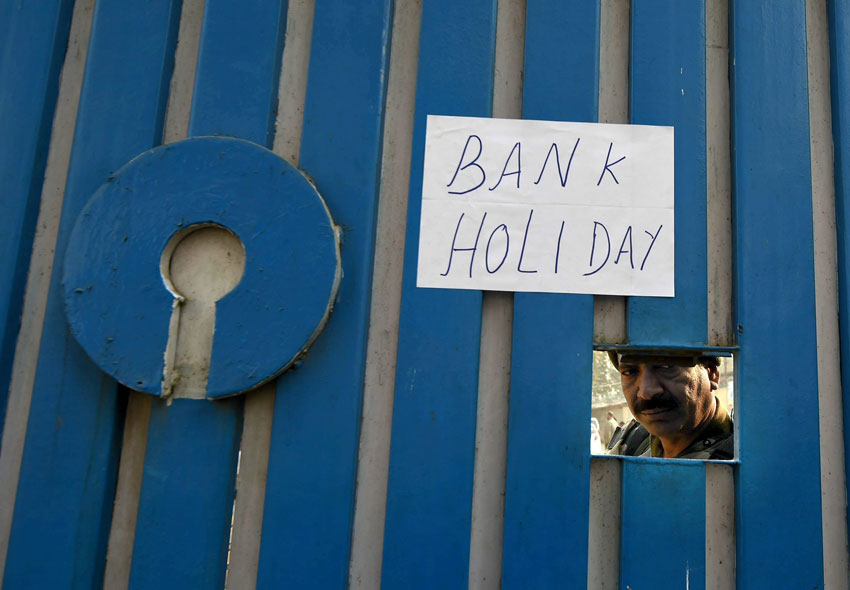
Kunal Bhardwaj, a TCS employee said, “Those who have black money will anyway find methods to get away. It is common man who will suffer. Now we have no option other than waiting in queues as there is no money for basic things as well.”
Following Prime Minister Narendra Modi’s announcement to withdraw the high denomination notes, the banks were ordered to remain closed to realign and reload new Rs. 500 and Rs. 2,000 currency.
Banks have been asked to be open on weekends including Sunday to deal with the situation. The ATMs will resume functioning as well but there is a limit of withdrawal of Rs. 2,000 per day which is expected to be increased in coming week.
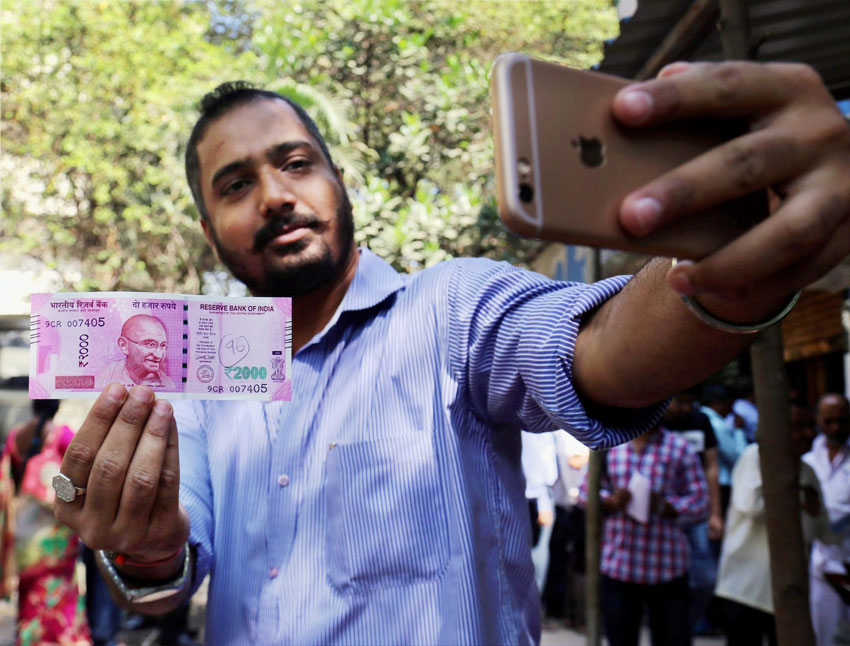
Major markets and shopping complexes reported marginal trading due to shortage of cash.
“There are around 9 lakh small traders in the city who have been hit directly by withdrawal of the notes. All the major markets including Chandni Chowk, Sadar, Lajpat Nagar, Sarojini Nagar, Khan Market, Khari Baoli have been affected as buyers have no money to spend,” said Brijesh Goyal, convener of Chamber of Trade and Industry.
Traders in various markets complained that either there were no customers and those who were coming to buy things were bringing Rs. 500 and Rs. 1,000 notes which are “useless” now.
“Nearly 80% of the market including grocery, garment, transport, bullion, hotels and restaurants and other businesses have been hit. Work has stopped at all the markets with traders preferring to sit at home and wait for situation to normalize,” Goyal said.
Transporters in the city also expressed concerns that the plying of trucks on the road will be hit soon as cash is not available in adequate quantity in the market.
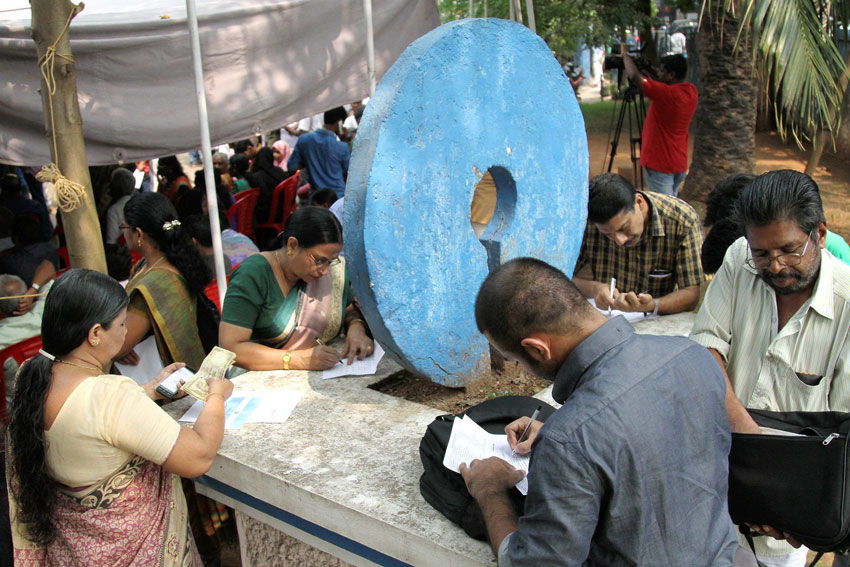
“Maximum withdrawal limit is Rs. 10,000 which is inadequate to meet the expense of plying a single truck on the road. What will happen to those transporters who have larger number of trucks? The transport of goods between Delhi and other parts of the country is likely to severely hit in coming days,” said Rajender Kapur, president of Delhi Goods Transport Organization.
Demonetization: I-T Dept. Conducts Surveys in Multiple Cities
Taxmen conducted surveys in Delhi, Mumbai and some other cities in the wake of reports of alleged profiteering and tax evasion by traders and other operators in reported conversion of demonetized currency notes, Nov. 10.
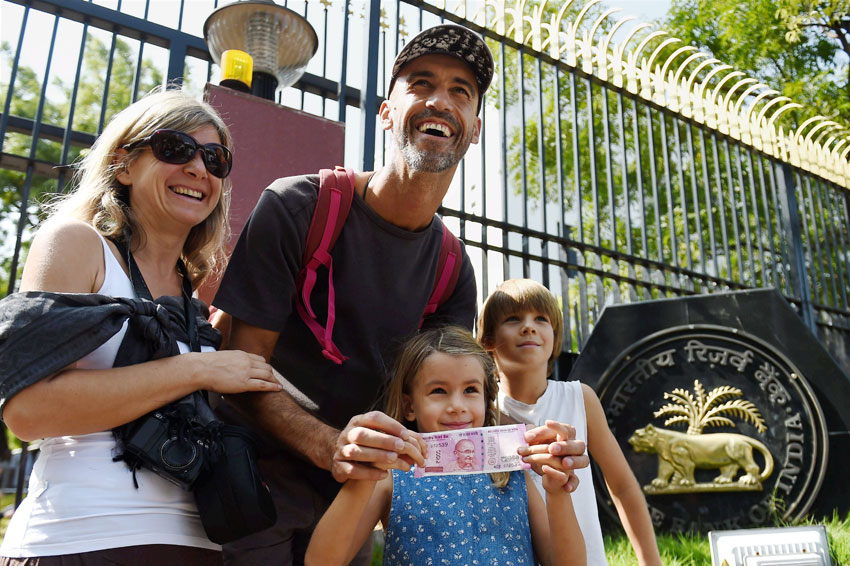
Officials said the survey operations were carried out in at least four locations in the national capital including popular market places like Karol Bagh, Dariba Kalan and Chandni Chowk, three locations in Mumbai and a few others in Chandigarh and Ludhiana.
Union Revenue Secretary Hasmukh Adhia described the department’s action as surveys under the Income Tax law.
Under the survey action, the tax sleuths visit business premises of the trader/operator and make analysis of the available stock and record it whereas under search operations both residential and business premises are visited by the taxman.
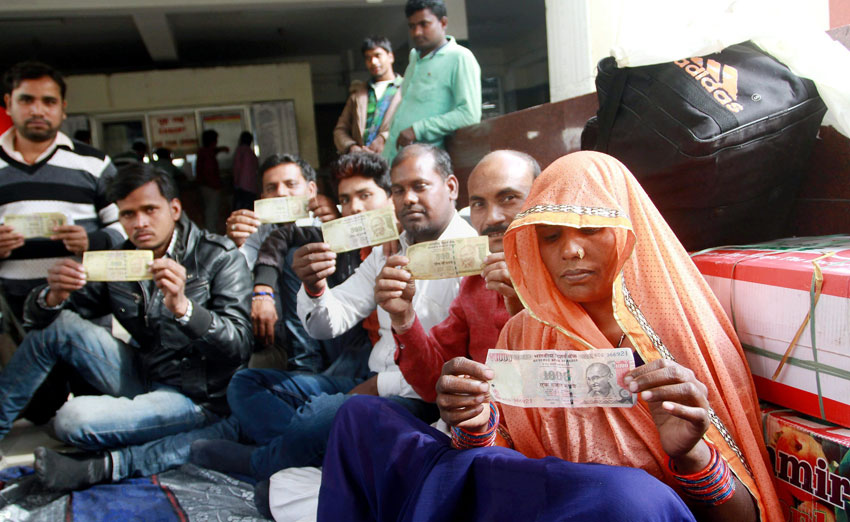
Sources said the department had received “specific inputs” that some traders, jewelers, currency exchanges and hawala dealers were allegedly exploiting the recent currency demonetization of Rs. 500 and Rs. 1,000 notes and were changing currencies at “discounted” prices, thereby profiteering illegally.
They said the operations were planned after CBDT Chairman Sushil Chandra asked, Nov. 9, all investigation units in the country to keep a check on suspicious movement of huge cash and other illegal transactions leading to tax evasion.
Officials added almost over 100 tax sleuths along with police officials were roped in for the survey operations.
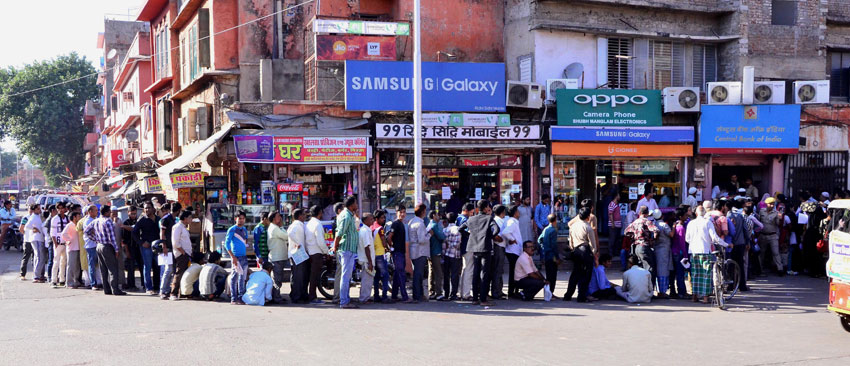
Finance Minister Arun Jaitley assured people that taxman will not hound those making small deposits in scrapped Rs. 500/1,000 currency adding, however, people with “large amounts of undisclosed monies will have to face the consequences under the tax laws.”
Top I-T department officials had yesterday said the government’s directive to them is “very clear,” saying any instance of tax evasion and black money should be dealt with strictly, especially after two opportunities in the form of one-time stash declaration window has been provided.
